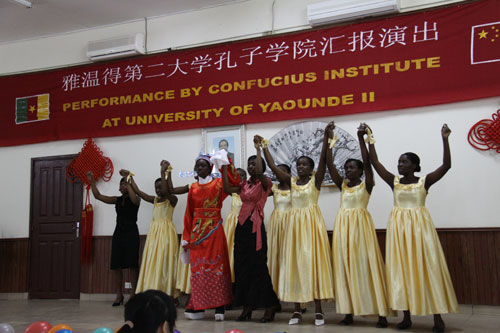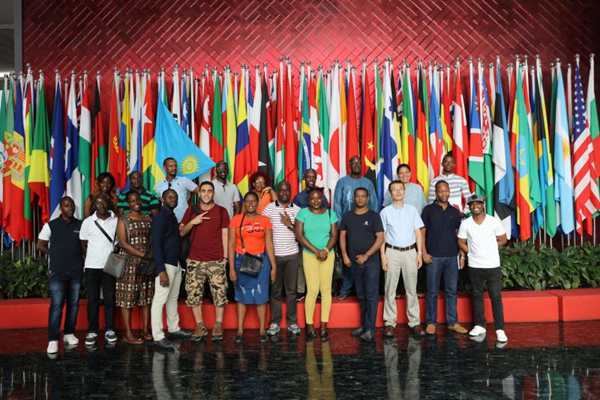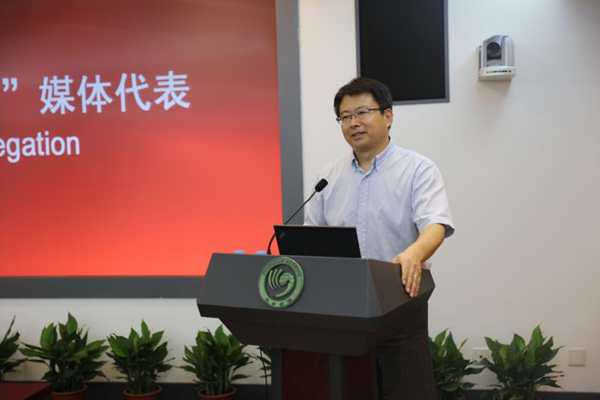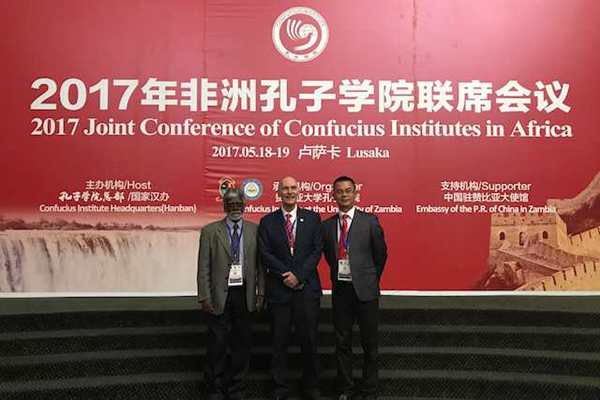


About 8,000 people are learning Chinese in Cameroon today. (Photo/Hanban)
Confucius Institute is looking forward to strengthening its presence in Cameroon, 10 years after its establishment in the campus of the International Relations Institute of Cameroon, IRIC. The school is under the University of Yaounde II, Soa. Today, there are 513 Confucius Institutes in 140 countries, with 48 of them in 37 African countries.
African journalists visit
Addressing African journalists on August 25 at the Confucius Institute international headquarters (or Hanban) in the Chinese capital, Beijing, an official, Wu Lei, said though they maintain deep roots in Cameroon, they wanted to promote more projects. Wu added that the institute has developed fast, boasting about 8,000 Chinese language learners in the country in about 40 centres.

African journalists and Hanban officials discussed prospects of the work of Confucius Institutes on the continent. (Photo/CAPC)
Fostering Cameroon-China cooperation
“We want to promote Chinese language in institutions and colleges. We are working on training more language instructors and fostering cooperation between Cameroon and China in business and other spheres. Our plan is to deepen exchanges in the spirit of the Belt and Road Initiative by enabling our two peoples to share their cultures,” Wu Lei explained.
He also disclosed that Confucius Institute intends to train Cameroonian talents in different fields in order to provide support to China-Cameroon cooperation. “We were attracted to Cameroon by its legendary cultural history and deep heritage, which mean much to Confucius Institute,” Wu Lei stated.

Xia Jianhui,Hanban deputydirector general, said Confucius Institutes offered almost 5,000 scholarships to students from 111 countries in 2016. (Photo/CAPC)
Confucius Institute activities
Xia Jianhui, Hanban deputy director general, said Confucius Institutes offer scholarships and Chinese language teaching resources. They organise Chinese Proficiency Tests and certify Chinese language teachers. In addition, they provide information and consultancy services on Chinese education, culture, etc, and conduct language and cultural exchanges between China and other countries.
Meanwhile, Hanban runs several training opportunities such as the Sino-foreign joint PhD programme, PhD programme in China, “Understanding China” visiting scholars’ programme, Young leaders’ programme, as well as offers international conference and publication grants. In 2016, 4,899 students from 111 countries received Confucius Institute scholarships, Xia Jianhui said.
According to Prof. Chen Mingkun, Deputy Dean of Zhejiang Normal University’s Institute of African Studies, a Chinese language centre was first established in Cameroon in 1996. This was followed by the creation of the Confucius Institute in 2007 under the University of Yaounde II. Meanwhile, Cameroon is one of four African countries that signed a mutual degree recognition agreement with China, officials disclosed.

There are currently 48 Confucius Institutes in 37 African countries. (Photo/Hanban)
Chinese language teachers graduate
“Ecole Normale Supérieure,” ENS, (or College of Education) of the University of Maroua on June 8, 2016 made history in Cameroon and in the Central African sub-region following the successful defence of Postgraduate Diploma or DIPES II theses in Chinese Language and Literature Education by seven students after five years of studies. The event was witnessed amongst others by Dr Moukouti Georges, Head of Department of Foreign Languages, ENS Maroua. Also in attendance was Dr Xu Young Liang, Deputy director of Confucius Institute, Yaounde, who formerly headed the Chinese Language Centre in Maroua.
Promoting Chinese culture
In an article published in the International Journal of Humanities and Social Science Volume 7, Number 2 of February 2017, Momo Ngomba Juliana of the College of Liberal Arts, Shanghai University, assesses the influence of Confucius Institute on Cameroon’s education and culture. Entitled “How China’s Confucius Centres Affect Cameroon’s Culture,” she begins by noting that the number of the institutes in the world reached about 480 in December 2014, nearly half of the 1,000 target envisaged by 2020.
*Kimeng Hilton Ndukong, a contributor to People’s Daily Online, is Sub-Editor for World News with Cameroon Tribune bilingual daily newspaper in Cameroon. He is currently a 2017 China-Africa Press Centre, CAPC fellow.
 Fire brigade in Shanghai holds group wedding
Fire brigade in Shanghai holds group wedding Tourists enjoy ice sculptures in Datan Town, north China
Tourists enjoy ice sculptures in Datan Town, north China Sunset scenery of Dayan Pagoda in Xi'an
Sunset scenery of Dayan Pagoda in Xi'an Tourists have fun at scenic spot in Nanlong Town, NW China
Tourists have fun at scenic spot in Nanlong Town, NW China Harbin attracts tourists by making best use of ice in winter
Harbin attracts tourists by making best use of ice in winter In pics: FIS Alpine Ski Women's World Cup Slalom
In pics: FIS Alpine Ski Women's World Cup Slalom Black-necked cranes rest at reservoir in Lhunzhub County, Lhasa
Black-necked cranes rest at reservoir in Lhunzhub County, Lhasa China's FAST telescope will be available to foreign scientists in April
China's FAST telescope will be available to foreign scientists in April "She power" plays indispensable role in poverty alleviation
"She power" plays indispensable role in poverty alleviation Top 10 world news events of People's Daily in 2020
Top 10 world news events of People's Daily in 2020 Top 10 China news events of People's Daily in 2020
Top 10 China news events of People's Daily in 2020 Top 10 media buzzwords of 2020
Top 10 media buzzwords of 2020 Year-ender:10 major tourism stories of 2020
Year-ender:10 major tourism stories of 2020 No interference in Venezuelan issues
No interference in Venezuelan issues
 Biz prepares for trade spat
Biz prepares for trade spat
 Broadcasting Continent
Broadcasting Continent Australia wins Chinese CEOs as US loses
Australia wins Chinese CEOs as US loses